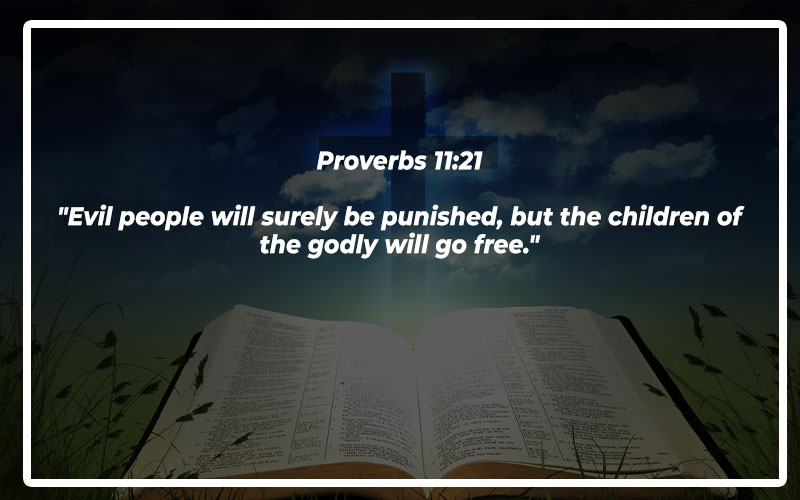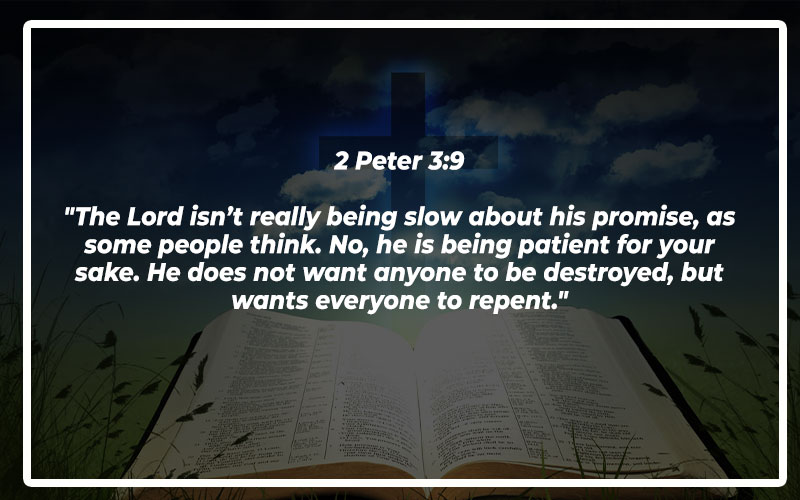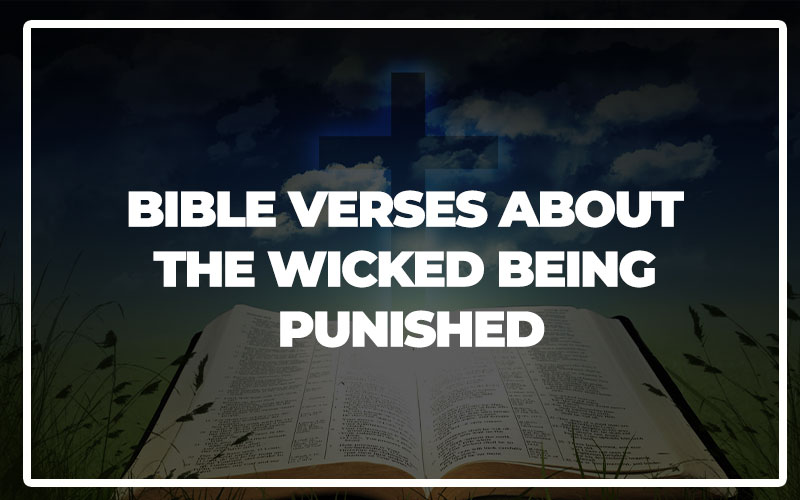Throughout the Bible, God is clear about the consequences of wickedness. The Scriptures provide a sobering reminder that those who live in rebellion against God will ultimately face His judgment. These passages highlight the certainty of divine justice and the fate that awaits those who persist in evil. Let these verses and reflections serve as a warning and a call to righteousness.
Also Read: Bible Verses About Enemies
The Certainty of God’s Judgment
God’s judgment is a recurring theme in the Bible, demonstrating that He does not overlook sin. The wicked, those who defy God’s laws and oppress others, will face the consequences of their actions. These verses underscore the inevitability of divine retribution.
Proverbs 11:21
“Evil people will surely be punished, but the children of the godly will go free.”

This verse reassures us that while the wicked may seem to thrive temporarily, their punishment is inevitable. In contrast, those who live righteously are promised deliverance. God’s justice ensures that evil will not go unpunished, and His protection extends to the godly and their descendants.
Psalm 37:28
“For the Lord loves justice, and he will never abandon the godly. He will keep them safe forever, but the children of the wicked will die.”
God’s commitment to justice is unwavering. This verse contrasts the eternal security of the righteous with the inevitable downfall of the wicked. While God’s love and protection are assured for those who follow Him, the wicked face destruction as a consequence of their actions.
Isaiah 3:11
“But the wicked are doomed, for they will get exactly what they deserve.”
Isaiah warns that the wicked will receive the full measure of punishment they deserve. God’s justice is perfect, ensuring that no evil deed goes unpunished. This verse serves as a sobering reminder of the consequences of living in opposition to God’s will.
2 Thessalonians 1:9
“They will be punished with eternal destruction, forever separated from the Lord and from his glorious power.”
Paul emphasizes the severity of the punishment awaiting the wicked—eternal separation from God. This verse highlights the ultimate consequence of rejecting God: not just physical death, but eternal spiritual death. The gravity of this punishment reflects the seriousness of turning away from God.
Romans 2:8
“But he will pour out his anger and wrath on those who live for themselves, who refuse to obey the truth and instead live lives of wickedness.”
This verse warns that self-centeredness and disobedience lead to God’s wrath. Living for oneself, in defiance of God’s truth, invites divine punishment. The imagery of God’s wrath being poured out conveys the intensity of His response to persistent wickedness.
The Downfall of the Wicked
The Bible frequently portrays the downfall of the wicked as inevitable. Despite their temporary success, they will not escape God’s judgment. These verses illustrate the certainty of their ultimate demise.
Psalm 73:18-19
“Truly, you put them on a slippery path and send them sliding over the cliff to destruction. In an instant they are destroyed, completely swept away by terrors.”
This passage vividly depicts the sudden and catastrophic downfall of the wicked. Their apparent stability is deceptive, as God has placed them on a path that leads to their destruction. The swiftness of their demise underscores the certainty of God’s judgment.
Proverbs 10:29-30
“The way of the Lord is a stronghold to those with integrity, but it destroys the wicked. The godly will never be disturbed, but the wicked will be removed from the land.”
Here, the path of the righteous is contrasted with the fate of the wicked. While the righteous find security in God, the wicked are destined for destruction. Their removal from the land signifies the complete and final nature of their judgment.
Psalm 37:38
“But the rebellious will be destroyed; they have no future.”
This verse offers a stark reminder of the ultimate fate of those who rebel against God. The wicked are not just punished, but completely eradicated, with no hope of a future. Their choices lead to a dead end, devoid of hope and lasting peace.
Jeremiah 17:13
“O Lord, the hope of Israel, all who turn away from you will be disgraced. They will be buried in the dust of the earth, for they have abandoned the Lord, the fountain of living water.”
Jeremiah speaks of the disgrace that awaits those who abandon God. The imagery of being buried in dust emphasizes the finality of their judgment. Turning away from God, the source of life, leads to spiritual and physical death, with no chance of restoration.
Job 20:5
“The triumph of the wicked has been short-lived and the joy of the godless has been only temporary.”
Job highlights the fleeting nature of the wicked’s success. Their triumph is temporary, and their joy is short-lived. This verse serves as a reminder that any gains achieved through wickedness are ultimately meaningless and will end in ruin.
God’s Hatred of Wickedness
Scripture makes it clear that God hates wickedness. His holy nature cannot tolerate sin, and His justice demands that it be punished. These verses reflect God’s righteous anger against those who persist in evil.
Psalm 5:4-6
“O God, you take no pleasure in wickedness; you cannot tolerate the sins of the wicked. Therefore, the proud may not stand in your presence, for you hate all who do evil. You will destroy those who tell lies. The Lord detests murderers and deceivers.”
These verses express God’s absolute intolerance for wickedness. He takes no pleasure in sin and cannot allow it in His presence. The strong language used here—’hate,’ ‘destroy,’ ‘detests’—emphasizes the seriousness with which God views sin and His commitment to eradicating it.
Proverbs 6:16-19
“There are six things the Lord hates—no, seven things he detests: haughty eyes, a lying tongue, hands that kill the innocent, a heart that plots evil, feet that race to do wrong, a false witness who pours out lies, a person who sows discord in a family.”
This passage lists specific behaviors that God detests. Each of these actions is rooted in wickedness and is an affront to God’s holiness. The strong language of ‘hate’ and ‘detests’ underscores the severity of these sins and God’s determination to punish those who commit them.
Psalm 11:5-6
“The Lord examines both the righteous and the wicked. He hates those who love violence. He will rain down blazing coals and burning sulfur on the wicked, punishing them with scorching winds.”
God’s examination of humanity reveals His righteous judgment. While He loves the righteous, He hates those who love violence. The vivid imagery of burning sulfur and scorching winds conveys the intensity of God’s wrath against the wicked and His commitment to justice.
Proverbs 15:9
“The Lord detests the way of the wicked, but he loves those who pursue godliness.”
Here, the contrast between the wicked and the godly is clear. God detests the path of the wicked because it leads away from His righteousness. In contrast, He loves those who strive for godliness, underscoring the importance of living in alignment with His will.
Isaiah 61:8
“For I, the Lord, love justice. I hate robbery and wrongdoing. I will faithfully reward my people for their suffering and make an everlasting covenant with them.”
God’s love for justice is paired with His hatred of robbery and wrongdoing. This verse reflects His deep commitment to righteousness and His promise to reward those who suffer for doing good. It also serves as a reminder that God’s justice will ultimately prevail.
The Consequences of Persistent Wickedness
Persistent wickedness, a life lived in defiance of God, carries severe consequences. The Bible warns that those who refuse to turn from their evil ways will face dire outcomes. These verses highlight the inevitable results of continuing in sin.
Romans 1:28-32
“Since they thought it foolish to acknowledge God, he abandoned them to their foolish thinking and let them do things that should never be done. Their lives became full of every kind of wickedness, sin, greed, hate, envy, murder, quarreling, deception, malicious behavior, and gossip.”
This passage reveals the devastating consequences of rejecting God. When people refuse to acknowledge Him, He allows them to follow their sinful desires, leading to a life filled with wickedness. The list of sins here illustrates the downward spiral that results from turning away from God.
Galatians 6:7-8
“Don’t be misled—you cannot mock the justice of God. You will always harvest what you plant. Those who live only to satisfy their own sinful nature will harvest decay and death from that sinful nature. But those who live to please the Spirit will harvest everlasting life from the Spirit.”
Paul warns that God’s justice cannot be mocked; everyone reaps what they sow. Those who live in wickedness will ultimately face decay and death. This verse highlights the inevitable consequences of sin and the contrasting reward for those who live according to God’s Spirit.
James 1:15
“These desires give birth to sinful actions. And when sin is allowed to grow, it gives birth to death.”
James provides a clear progression from desire to sin and ultimately to death. This verse emphasizes the destructive nature of sin when it is allowed to flourish. Persistent wickedness leads to spiritual and physical death, showing the seriousness of unrepentant sin.
2 Peter 2:4-6
“For God did not spare even the angels who sinned. He threw them into hell, in gloomy pits of darkness, where they are being held until the day of judgment. And God did not spare the ancient world—except for Noah and the seven others in his family. Noah warned the world of God’s righteous judgment. So God protected Noah when he destroyed the world of ungodly people with a vast flood.”
This passage offers historical examples of God’s judgment on wickedness, from the rebellious angels to the flood that wiped out the ungodly. It underscores that God’s judgment is not just for individuals but can extend to entire communities. The lesson is clear: persistent wickedness will not go unpunished.
Deuteronomy 28:15
“But if you refuse to listen to the Lord your God and do not obey all the commands and decrees I am giving you today, all these curses will come and overwhelm you.”
God’s warning to Israel highlights the consequences of disobedience. If they refuse to listen and persist in wickedness, they will be overwhelmed by curses. This verse illustrates the seriousness of ignoring God’s commands and the comprehensive nature of the punishment that follows.
Also Read: Bible Verses About Bad Friends
God’s Patience and the Call to Repentance
Although God is just and will punish the wicked, He is also patient, giving people time to repent. These verses reveal God’s desire for sinners to turn from their wicked ways and embrace righteousness before it’s too late.
2 Peter 3:9
“The Lord isn’t really being slow about his promise, as some people think. No, he is being patient for your sake. He does not want anyone to be destroyed, but wants everyone to repent.”

Peter explains that God’s apparent delay in judgment is actually an expression of His patience. He desires that everyone repent and be saved. This verse highlights God’s mercy, emphasizing that while punishment is certain for the wicked, God gives ample opportunity for repentance.
Ezekiel 18:23
“Do you think that I like to see wicked people die? says the Sovereign Lord. Of course not! I want them to turn from their wicked ways and live.”
God reveals His heart in this verse, expressing His preference for repentance over punishment. He takes no pleasure in the death of the wicked and desires that they turn from their evil ways and live. This passage underscores God’s love and His willingness to forgive those who repent.
Isaiah 55:7
“Let the wicked change their ways and banish the very thought of doing wrong. Let them turn to the Lord that he may have mercy on them. Yes, turn to our God, for he will forgive generously.”
This verse is an invitation to repentance, promising mercy and forgiveness for those who turn to God. It emphasizes the generous nature of God’s forgiveness and the hope available even to the wicked if they repent. God’s desire is for restoration, not destruction.
Joel 2:13
“Don’t tear your clothing in your grief, but tear your hearts instead. Return to the Lord your God, for he is merciful and compassionate, slow to get angry and filled with unfailing love. He is eager to relent and not punish.”
Joel urges the people to genuinely repent, not just outwardly but inwardly. God’s nature is merciful and compassionate, and He is eager to forgive rather than punish. This verse highlights the importance of true repentance and God’s readiness to show mercy to those who seek Him sincerely.
Romans 2:4
“Don’t you see how wonderfully kind, tolerant, and patient God is with you? Does this mean nothing to you? Can’t you see that his kindness is intended to turn you from your sin?”
Paul emphasizes that God’s kindness and patience are meant to lead people to repentance. Rather than taking God’s mercy for granted, we should recognize it as an opportunity to turn from sin. This verse calls for a response to God’s grace, urging repentance before it’s too late.
The Fate of the Wicked vs. the Righteous
Finally, the Bible draws a clear distinction between the fate of the wicked and the righteous. While the wicked face judgment and destruction, the righteous are promised eternal life. These verses illustrate the contrasting destinies of those who reject God and those who follow Him.
Matthew 25:46
“And they will go away into eternal punishment, but the righteous will go into eternal life.”
Jesus contrasts the fate of the wicked and the righteous in this verse. The wicked will face eternal punishment, a stark reminder of the consequences of rejecting God. In contrast, the righteous are promised eternal life, highlighting the ultimate reward for those who follow Christ.
Psalm 1:6
“For the Lord watches over the path of the godly, but the path of the wicked leads to destruction.”
This verse presents a clear distinction between the paths of the godly and the wicked. God watches over and protects the righteous, while the wicked are on a path that leads to destruction. The verse serves as a reminder of the divergent outcomes based on one’s choices.
Daniel 12:2
“Many of those whose bodies lie dead and buried will rise up, some to everlasting life and some to shame and everlasting disgrace.”
Daniel speaks of the final resurrection, where both the righteous and the wicked will rise. The righteous will inherit everlasting life, while the wicked will face shame and everlasting disgrace. This verse underscores the eternal nature of the consequences of one’s life choices.
Malachi 4:1
“The Lord of Heaven’s Armies says, ‘The day of judgment is coming, burning like a furnace. On that day, the arrogant and the wicked will be burned up like straw. They will be consumed—roots, branches, and all.'”
Malachi prophesies a day of judgment where the wicked will be completely consumed. The imagery of fire and burning underscores the totality of their destruction. This verse serves as a final warning of the fate that awaits those who continue in wickedness.
John 5:29
“And they will rise again. Those who have done good will rise to experience eternal life, and those who have continued in evil will rise to experience judgment.”
Jesus speaks of the resurrection of all people, where the righteous will rise to eternal life and the wicked to judgment. This verse highlights the ultimate accountability every person faces and the eternal consequences of living in either righteousness or wickedness.
Also Read: Bible Verses About Betrayal
What Does the Bible Say About the Wicked Being Punished
The Bible teaches us that wickedness does not go unpunished. God sees everything, including the actions and intentions of every person. Wickedness, which includes evil actions and a heart that is turned away from God, brings consequences. God is a just judge who does not ignore wrongdoing. He knows when people choose to do what is wrong, hurt others, or live in ways that go against His will.
One key point the Bible makes is that the punishment of the wicked is certain. Though it might seem like wicked people are getting away with their actions for a time, the Bible assures us that their judgment will come. God’s timing is perfect, and He knows when and how to bring justice. This could happen in this life or after death, but it will happen. No one can escape God’s justice.
The punishment of the wicked is not just about what happens after they die. Often, people who live wicked lives experience the consequences of their actions even while they are alive. Their choices lead to trouble, broken relationships, and inner turmoil. They may appear successful or happy on the outside, but their lives are often filled with pain and emptiness.
God’s justice is not just about punishment; it is also about correcting wrongs and restoring what is right. He wants everyone to turn away from wickedness and come to Him for forgiveness. Those who refuse to change and continue in their wicked ways will face God’s judgment. However, God is patient and gives people the chance to repent, because He does not want anyone to be destroyed.

